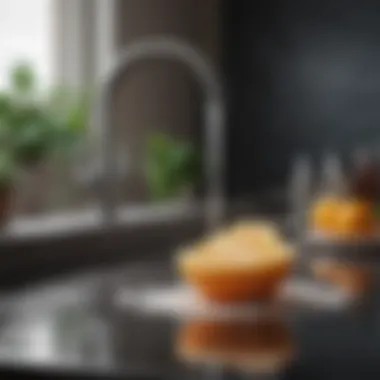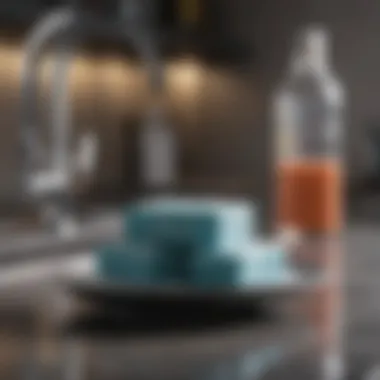Eco-Friendly Dishwasher Soap Alternatives


Intro
As concerns over environmental sustainability and personal health grow, many homeowners are evaluating their cleaning products, including dishwasher soap. Commercial dishwasher soaps can contain harsh chemicals that not only impact the environment but may also pose health risks. This comprehensive guide delves into alternative options for dishwasher soap, offering insights into their effectiveness, safety, and efficacy. By exploring both natural ingredients commonly found at home and store-bought solutions, readers can make informed decisions tailored to their dishwashing needs.
Understanding the options available can transform your dishwashing habits and contribute positively to both your household and the broader environment.
Key Insights and Trends
The Move Towards Eco-Friendly Options
Increasingly, consumers are shifting away from traditional cleaning products in search of environmentally-friendly alternatives. This trend is driven by a growing awareness of sustainability and health concerns. Many people are now exploring alternative ingredients that achieve cleanliness without the adverse effects of chemical-laden products.
Natural options such as baking soda, vinegar, and lemon juice are gaining popularity due to their low toxicity and multifunctional properties. These ingredients not only clean effectively but also minimize the environmental footprint of common household tasks.
The Rise of Plant-Based Commercial Products
Alongside homemade solutions, there is a notable rise in the market for plant-based commercial dishwasher soaps. Brands such as Seventh Generation and Ecover emphasize non-toxic, biodegradable ingredients. These products appeal to consumers looking for convenience without compromising on safety or sustainability. The growing acceptance of these commercial options reflects a societal shift towards cleaner, greener living.
Practical Tips and How-To Guides
Creating Homemade Dishwasher Soap
If you prefer a more hands-on approach, making your own dishwasher detergent is feasible and rewarding. Here’s a simple recipe to get you started:
Ingredients:
- 1 cup of baking soda
- 1 cup of washing soda
- 1 cup of kosher salt
- 1/2 cup of citric acid
Instructions:
- Combine all ingredients in a large bowl.
- Stir until well mixed, ensuring clumps are broken up.
- Store in an airtight container to maintain freshness.
- Use 1 tablespoon of this mixture per load.
Safety Considerations
Using homemade or alternative dishwasher soaps can raise safety concerns, particularly if you have children or pets. It is crucial to:
- Ensure all ingredients are placed out of reach.
- Test any new solution on a small area before full use to avoid potential damage to your dishwasher.
- Properly label homemade detergents to prevent accidental consumption.
Cost-Effectiveness
When examining cost, homemade options typically offer greater savings when compared to name-brand products. Ingredients such as baking soda and vinegar are relatively inexpensive and multi-purpose, providing value beyond just dishwashing. However, consider the time cost involved in creating these mixtures. Many families may find that store-bought solutions save time, which is also an important factor in overall cost-effectiveness.
Using alternative options for dishwasher soap not only supports better health and environmental habits but also offers practical benefits. Readers are encouraged to explore these alternatives to discover what best suits their dishwashing needs.
Understanding Dishwasher Soap
In any household, the function of dishwasher soap is critical for maintaining hygiene and ensuring that utensils and crockery are devoid of contaminants. Understanding dishwasher soap goes beyond the mere act of cleaning; it encompasses aspects such as safety, health implications, and environmental concerns. With the myriad of options available, exploring these elements is essential for making knowledgeable choices. This article aims to elevate your awareness of not only what dishwasher soap does but also what makes it effective and safe for everyday use.
Functionality of Dishwasher Soap
Dishwasher soap serves a fundamental role in the cleaning process. Its primary function is to break down food particles, grease, and stains on dirty dishes, ensuring that they are sanitized and free from residues. The soap contains surfactants that lower the surface tension of water, allowing it to penetrate more effectively into soiled surfaces. Combined with mechanical action from the dishwasher’s spray arms, this leads to a more thorough clean than water alone can provide.


It is worth noting that various commercial dishwasher soaps may include different types of enzymes, fragrances, and cleaning agents tailored for specific cleaning tasks. For example, enzyme-based dish soaps can target protein and starch residues, enhancing their performance in removing baked-on grime. This means that the choice of soap can greatly influence the overall cleaning success.
Importance of Proper Cleaning
Proper cleaning of dishes is paramount in any culinary context. It is not merely about aesthetics; it directly impacts health. Dishware can harbor harmful bacteria, which may lead to foodborne illnesses if not adequately sanitized. Ensuring that your cleaning solution is effective is thus integral to maintaining kitchen hygiene.
Moreover, neglecting proper cleaning can lead to the buildup of residues and odors, which can be unappealing. This can affect the taste of food and compromise meal experiences. Understanding the importance of proper cleaning and which dissolvers work best will also help in extending the lifespan of your dishware.
In summary, comprehending the role of dishwasher soap enables individuals to make informed decisions about their cleaning products. For those who prioritize health and environmental concerns, this knowledge can guide them toward safer alternatives, leading to a cleaner and healthier home environment.
"The right dishwasher soap is crucial not just for clean dishes, but to maintain a healthy kitchen."
Choosing wisely can save time, enhance safety, and deliver a better dishwashing experience overall.
Commercial Dishwasher Soaps
Commercial dishwasher soaps play a significant role in modern dishwashing practices. Thinking through these cleaning agents is essential for both efficiency and effectiveness. Many homeowners rely on these products for their convenience and ability to manage tough stains and food residues. However, understanding the ingredients and their implications can lead to smarter choices.
Overview of Typical Ingredients
When examining commercial dishwasher soaps, it is critical to know what they contain. Most of these products are composed of several active and inactive ingredients. Commonly, one can find:
- Surfactants: These reduce the surface tension of water, allowing it to penetrate and lift away food particles.
- Enzymes: Protease and amylase are often included to break down proteins and starches. This behavior helps in dealing with stubborn residues.
- Bleaching Agents: Sodium percarbonate is an example, known for its ability to brighten dishes and tackle stains.
- Fragrances and Dyes: While these ingredients enhance aesthetic appeal, they may not be necessary for effective cleaning.
- Phosphates: Some products include phosphates which assist in softening the water, making it easier to clean. However, the environmental impact of phosphates raises concerns.
Each of these components can affect the efficacy and safety of the dish soap. As a cautious consumer, scrutinizing labels is a wise practice.
Pros and Cons of Commercial Options
Evaluating commercial dishwasher soaps is not simply about effectiveness; one must also weigh their drawbacks. Understanding these pros and cons enables informed decisions:
Pros:
- Convenience: Ready to use and specifically formulated for dishwashers.
- Efficacy: Many commercial options are adept at dealing with greasy residues and baked-on foods.
- Variety: A wide range of scents and formulations are available, catering to different preferences.
Cons:
- Chemical Concerns: Some components could pose health risks or environmental harm. Choosing products with fewer harsh chemicals can alleviate these worries.
- Cost: Commercial soaps can be more expensive over time compared to natural alternatives.
- Packaging Waste: The frequent purchase of these products contributes to environmental waste.
"Being aware of both the advantages and disadvantages can empower users to make choices that align with personal values and needs."
Household Alternatives
Household alternatives to commercial dishwasher soaps are gaining traction among consumers who wish to reduce their environmental footprint and explore cost-effective cleaning solutions. These options are frequently formulated from common household ingredients, making them accessible and often less expensive than store-bought alternatives. The use of household items like baking soda, vinegar, lemon juice, and Castile soap offers not only cleaning efficacy but also aligns with a desire to avoid synthetic chemicals and preservatives found in many commercial options. Understanding these alternatives is crucial in identifying methods that are both gentle on the planet and effective in maintaining kitchen hygiene.
Baking Soda: A Versatile Cleaner
Baking soda, scientifically known as sodium bicarbonate, stands as a staple in many households and is known for its remarkable cleaning properties. Its texture allows it to act as a mild abrasive, effectively removing food particles and stains without scratching sensitive surfaces. Baking soda also has deodorizing abilities, neutralizing unpleasant odors that can linger even after washing.
To use baking soda as a dishwasher soap alternative, one can simply sprinkle a couple of tablespoons into the utensil basket before starting a wash cycle. This approach enhances the overall cleaning efficacy and leaves dishes smelling fresh. Note that for particularly greasy items, combining baking soda with other natural ingredients can optimize results.
Vinegar: Natural Disinfectant


Vinegar, particularly white vinegar, is celebrated for its disinfecting properties. Acetic acid, the key component in vinegar, effectively eliminates bacteria and can break down mineral deposits often found on glassware and utensils. This makes it not only a cleaner but also a sanitizing agent.
When utilizing vinegar in dishwasher practices, it is suggested to add a cup to the bottom of the machine before running it. This can replace the rinse aid, providing additional shine to dishes and glasses. However, it’s important to mention that using vinegar too often may affect certain dishwasher materials, such as rubber seals, so moderation is key.
Lemon Juice: Nature’s Freshener
Lemon juice is an excellent natural alternative for those seeking freshness in cleaning. The citric acid in lemon juice is known for its antibacterial and stain-removing properties. Its natural fragrance also leaves behind a pleasant scent, contributing to a cleaner, fresher kitchen environment.
Using lemon juice in the dishwasher is simple. One can add a few tablespoons into the detergent compartment or directly onto heavily soiled items. This not only helps cut through grease but also enhances the dishwasher’s deodorizing abilities. It’s a slight yet effective addition that optimizes the cleaning experience.
Castile Soap: Eco-Friendly Option
Castile soap is a plant-based soap that originated from the Castile region of Spain. Made from olives, this soap is biodegradable and free from synthetic additives, making it a favorite for environmentally minded consumers. Its versatility allows it to be used not only for dishwashing but for various cleaning tasks around the house.
When using Castile soap in a dishwasher, just a small amount can be effective. Mixing an ounce with water creates a gentle yet effective detergent that cleans dishes while minimizing ecological impact. While it may not create the same suds as commercial options, its cleaning power is substantial, ensuring dishes come out clean and ready to use.
"Exploring household alternatives not only provides effective cleaning but contributes towards sustainable living practices."
In summary, household alternatives for dishwasher soap present a viable way to maintain cleanliness in a sustainable manner. Baking soda, vinegar, lemon juice, and Castile soap are all not only effective but also economical and environmentally friendly. By incorporating these options into regular cleaning routines, households can achieve sparkling dishes while reducing reliance on commercial cleaning agents.
Store-Bought Natural Alternatives
As individuals become increasingly aware of the environmental impact of their choices, store-bought natural alternatives for dishwasher soap gain significance. These products cater to the growing demand for eco-friendly cleaning agents that effectively clean dishes without harsh chemicals. Unlike traditional options, natural alternatives are typically made from plant-based ingredients and free from synthetic compounds. They provide a viable solution for homeowners seeking to maintain cleanliness while being mindful of their environmental footprint.
With various options available, it is crucial to understand the specific elements involved in these formulations. The benefits can range from reducing the chemical load on your dishes and the environment to potentially lowering the risk of allergic reactions or skin irritations. Thus, evaluating these products becomes an essential part of making informed decisions in the kitchen.
Exploring Plant-Based Formulations
Plant-based formulations are at the forefront of the movement towards sustainable cleaning solutions. These products are derived from natural sources such as coconut, corn, and palm oil. They often eschew phosphates, phosphonates, and other aggressive chemicals that have been linked to environmental degradation.
Among the notable brands, Seventh Generation and Ecover stand out for their commitment to sustainability. They focus on using biodegradable ingredients while ensuring compatibility with most dishwashers. Some products also incorporate enzymes, which can enhance cleaning performance by breaking down food residues more effectively.
When purchasing plant-based formulations, consider the following aspects:
- Ingredient Transparency: Check for clear labeling that outlines the sources of ingredients.
- Certifications: Look for eco-certifications that validate their environmental claims.
- Environmental Impact: Assess the lifecycle of the product, from manufacturing to disposal.
Benefits of Biodegradable Products
Biodegradable products offer a significant advantage by breaking down more naturally in the environment compared to traditional cleaners. Using such products contributes to lessening pollution and toxic buildup. Here are some key benefits to consider:
- Reduced Environmental Harm: Biodegradable substances are less likely to contribute to waterway pollution.
- Safer for Wildlife: As these products break down organically, they pose a lower risk to aquatic life compared to their synthetic counterparts.
- Non-Toxic Formulations: Many biodegradable dish soaps avoid toxic ingredients, making them safer for both dishware and the individuals who handle them.
- Consumer Health: Reduced exposure to harsh chemicals can lead to improved health outcomes for users, particularly for those with respiratory issues or skin sensitivities.
"Opting for biodegradable and plant-based options is not just a trend; it's a prudent choice for health-conscious consumers aiming to create a safer living environment."
In sum, exploring store-bought natural alternatives opens up a realm of options that align with modern values of sustainability and health. By focusing on plant-based formulations and biodegradable products, homeowners can achieve effective cleaning without compromising their principles. This strategic shift not only benefits individual households but also contributes positively to larger environmental initiatives.
Safety Considerations
Understanding the safety considerations when using alternative options for dishwasher soap is vital for achieving effective and safe cleaning results. These considerations apply to both homemade solutions and store-bought products, ensuring that users are aware of potential hazards and how to prevent them. Overall, prioritizing safety will augment the benefits of using alternative cleaning agents while minimizing risks associated with their use.
Potential Risks of Homemade Solutions


Homemade dishwasher soap solutions often contain common household ingredients like baking soda, vinegar, and lemon juice. While these are typically safe for general use, they may present certain risks when used in dishwashers.
- Inconsistent Cleaning Power: Homemade mixtures can vary significantly in strength. A poorly balanced solution may leave residues on dishes, leading to incomplete cleaning.
- Chemical Reactions: Certain combinations of common products can lead to detrimental reactions. For instance, mixing vinegar with baking soda creates a fizzing reaction that may not only be ineffective for cleaning but also could damage specific dishwasher components.
- Corrosive Effects: Some solutions may not be well-suited for the materials used in dishwashers. High concentrations of acidic ingredients can lead to corrosion of metal parts over time.
- Risk of Contamination: Homemade solutions often lack preservatives, which can lead to microbial growth, presenting health risks when it comes to cleaning kitchen items.
It is essential to test any mixture in small amounts before committing to a full wash cycle. Always observe how your dishwasher reacts, and if uncertain, consider consulting user manuals for guidance on safe cleaning agents.
Interactions with Dishwasher Materials
The materials used in dishwashers, such as plastics and metals, can be sensitive to certain ingredients. This interaction is crucial when choosing alternative soaps.
- Effect on Seals and Hoses: If alternative soaps are too acidic or corrosive, they can degrade seals and hoses over time. This can lead to leaks and additional maintenance costs.
- Staining Risks: Some natural ingredients can stain plastic components within the dishwasher, leading to unsightly discoloration that may not be reversible.
- Foaming Issues: Certain homemade solutions might create excessive foam. Too much foam can overflow and damage the electronic components of the machine, resulting in operational failures.
- Tensile Strength Deterioration: Prolonged exposure to high concentrations of vinegar or essential oils can weaken the plastic and rubber materials used in the dishwasher, impacting longevity and effectiveness.
Considering these interactions can save homeowners unforeseen expenses and ensure a longer lifespan for their appliances.
Taking necessary precautions with any cleaning agent can preserve both health and appliance integrity.
Cost-Effectiveness of Alternatives
Understanding the cost-effectiveness of dishwasher soap alternatives is vital for homeowners and those who often host gatherings. This section evaluates economic factors, benefits, and considerations about using both natural and store-bought options. It helps readers assess the financial implications of their choices, making them better equipped to manage household expenses without compromising on cleanliness.
Comparative Analysis of Costs
The financial aspect of selecting dishwasher soap alternatives is critical. On one hand, commercial dishwasher soaps, while convenient, often carry a higher cost. For instance, a bottle of Cascade Platinum usually retails for about $10, depending on the store and promotions. While this price may seem reasonable, it can add up, especially for larger families or frequent dishwashers.
On the other hand, natural alternatives, such as baking soda or vinegar, are available at a fraction of the cost. A 4-pound box of baking soda costs approximately $2, while a gallon of white vinegar can be found for around $3. Considering the quantity one can use for multiple cleaning sessions, these natural solutions are often much more economical across time.
"Choosing natural alternatives is not just about saving money; it's also about making responsible choices for the environment."
In comparing the cost-effectiveness, several factors are to be considered:
- Quantity and usage: Commercial soaps often require specific dosages, while natural alternatives can be more flexible.
- Load Capacity: Natural alternatives can often clean just as efficiently when used correctly, prolonging the need for restocking.
- Brand Disparity: The price of branded products compared to generic options can vary significantly.
Long-Term Savings with Natural Solutions
Adopting natural cleaning solutions can lead to substantial long-term savings. Firstly, they tend to be concentrated, meaning a small amount can effectively clean a full load in your dishwasher. This efficiency makes natural ingredients like castile soap highly appealing.
Moreover, natural solutions are often multi-purpose. For instance, vinegar can be utilized not just in dishwashing but also for cleaning surfaces or laundry. This versatility contributes to savings by reducing the need for multiple cleaning products.
Additionally, making use of natural ingredients aids in minimizing waste. Many alternatives can be purchased in bulk or stored in reusable containers. Streamlining your cleaning agents in this way lowers expenses further.
Over time, the cumulative savings from using natural over commercial products can be significant. For an environment-conscious consumer, this choice aligns with sustainable practices alongside saving money. Thus, integrating such alternatives into regular cleaning routines can lead to a tangible reduction in both financial expenditure and environmental impact.
Ending and Recommendations
The conclusion of this article serves as a key focal point for readers looking to reassess their approach to dishwasher cleaning products. The transition from conventional to alternative forms of dishwasher soap is significant not only for the effectiveness of cleaning but also for environmental considerations. The importance of evaluating the various options available cannot be overstated. Using alternatives allows homeowners to make informed decisions, prioritizing both personal health and planetary sustainability.
Best Practices for Effective Dishwashing
Effective dishwashing goes beyond merely loading the dishwasher and selecting a cycle. Some best practices enhance cleaning while maximizing the life of the appliance and the dishes themselves:
- Pre-Rinse Dishes: Before placing dishes inside, remove any leftover food. This reduces the strain on the cleaning agents and can improve cleaning outcomes.
- Load Strategically: Ensure that larger items do not block the spray arms. Place smaller items on the top rack and larger ones below.
- Use the Right Amount of Soap: Too much detergent can create residue, while too little may not clean effectively. Follow guidelines based on the alternative soap being used.
- Optimize Cycle Selection: Select a cycle duration that matches the level of soiling on your dishes. This can save energy as well as prolong appliance life.
- Regular Maintenance: Periodically clean the filter and arms of the dishwasher. This ensures optimal performance and reduces the chances of buildup.
Final Thoughts on Dishwasher Soap Alternatives
Exploring alternative options for dishwasher soap opens up numerous benefits, but also requires consideration. Homemade solutions and natural alternatives offer an effective and often safer cleaning method, yet they may not always be as effective against stubborn stains as some commercial products. It is essential to recognize that not all options will suit every household. Individual factors such as the type of dishwasher and the water hardness can significantly influence performance.
- Consider Your Needs: Evaluate which alternatives align with your household's cleaning patterns. Some may prefer the simplicity of commercial options, while others embrace homemade solutions like baking soda or vinegar.
- Experiment Cautiously: The efficacy of natural alternatives can vary. Testing different combinations and methods is crucial to discover the best fit for your specific requirements.
- Stay Informed: Keep abreast of new developments in eco-friendly cleaning products. The market is continually evolving, and new options are frequently emerging that can meet both effectiveness and sustainability demands.



